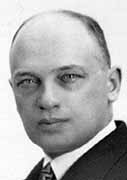
| Savelij TARTAKOVER |
 |
 |
Savelij Grigorevič Tartakover,forse più noto nella traslitterazione francese di Xavier Tartakover, nacque il 21 febbraio del 1887 a Rostov sul Don ed è stato uno dei migliori teorici degli scacchi del suo tempo.
Pur se di nascita russo, quando ne ebbe la possibilità scelse la cittadinanza polacca pur non parlando la lingua di quel Paese.
Di origine ebree, quando aveva solo 12 anni dovette assistere all'assassinio di entrambi i genitori durante un pogrom, superata questa terribile esperienza si trasferì a Vienna nel 1904 dove studiò giurisprudenza, ed intraprese la carriera di avvocato.
Fu proprio nella capitale austriaca che mise inizialmente in mostra le sue doti di valente scacchista. Partecipò alla guerra come tenente dell'esercito austriaco e alla fine del primo conflitto mondiale si trasferì in Francia dove combatté con il nome di battaglia di Cartier nelle file della resistenza guidate dal generale De Gaulle.
Al termine della guerra, ottenuta la cittadinanza francese giocò in prima scacchiera per i transalpini e assieme ad altri fu capostipite della teoria ipermoderna che pose le sue basi sulle aperture indiane.
Fu due volte campione polacco ed una volta campione di Francia e non disdegnò di misurarsi anche con il bridge.
Scomparve a Parigi il 5 febbraio del 1956.
![]()
![]() Savelij Grigorevič Tartakover, perhaps best known in the French
transliteration of Xavier Tartakover, was born on 21st February
1887 in Rostov-on-Don and was one of the best chess theorists of
his time.
Savelij Grigorevič Tartakover, perhaps best known in the French
transliteration of Xavier Tartakover, was born on 21st February
1887 in Rostov-on-Don and was one of the best chess theorists of
his time.
Although of Russian birth, when he had the opportunity he chose Polish citizenship while not speaking the language of that country.
Of Jewish origin, when he was only 12 years old he had to witness the murder of both his parents during a pogrom, after this terrible experience he moved to Vienna in 1904 where he studied law, and began his career as a lawyer.
It was precisely in the Austrian capital that he initially put on display his talents as a skilled chess player.
He took part in the war as a lieutenant in the Austrian army and at the end of the First World War he moved to France where he fought with the battle name of Cartier in the ranks of the resistance led by General De Gaulle.
At the end of the war, obtained the French citizenship played in the first chessboard for the transalpine and together with others it was the progenitor of the hypermodern theory that laid its foundations on the Indian openings.
He was twice Polish champion and once champion of France and did not disdain to compete with the bridge.
He disappeared in Paris on February 5, 1956.
| Precedente / Previous |